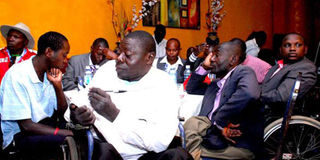It’s important to consider the sensibilities of all, especially people with disabilities

Disabled people follow proceedings during a past forum at the KICC in Nairobi. FILE PHOTO | SALATON NJAU | NATION MEDIA GROUP
What you need to know:
- It is important that editors understand and use politically correct terms with regard to disabilities so as to promote tolerance and acceptance of persons living with disabilities.
- Our Constitution, which protects individual rights, uses the politically correct term “persons with disabilities”, not “the disabled”.
Riara Law School lecturer Eric Kibet wrote a commentary published in the Daily Nation of November 6 under the title “Let’s focus on the needs of the disabled”.
All references to “persons with disabilities” were replaced with the term “the disabled”.
Mr Kibet complained about the changes, which he said offended readers living with disabilities because disability does not mean “inability” or that one is “disabled.”
He said the term “disabled” is wrong and unacceptable because it stigmatises.
He said editors should be sensitised about these terms and the feelings of the people described.
“It’s important the editors keep abreast with changes in language and contemporary terminologies.”
It is important that editors understand and use politically correct terms with regard to disabilities so as to promote tolerance and acceptance of people living with disabilities.
According to some opinions, using the term “the disabled” is verbal assault.
PERPETUATING STEREOTYPES
Such opinions equate the term “disabled” to calling a person “a cripple”, “an imbecile”, or “retarded” and think it is a thoughtless use of words.
According to this school of thought, the term “the disabled” objectifies a person as if disability is his or her defining characteristic whereas the term “person with disability” calls attention to the person first and the disability becomes secondary.
The proponents of this opinion say the term “the disabled” is limiting, humiliating, and offensive.
They think it perpetuates stereotypes and draws attention to a person who should be pitied, is helpless, and dependent, but that a person who has a physical, sensory, or mental disability has individuality and some abilities too.
Our Constitution, which protects individual rights, uses the politically correct term “persons with disabilities”, not “the disabled”.
Further, Article 54 of the Constitution provides that a person with any disability is entitled “to be treated with dignity and respect and to be addressed and referred to in a manner that is not demeaning.”
Unfortunately, Section 146 of the Penal Code violates the Constitution by referring to certain people with disabilities as “idiots” and “imbeciles” (with whom it is a felony to have or attempt to have sex, and you can be jailed for 14 years with hard labour for the crime).
*****
Michael Hatego, one of the most consistent critics of our journalism, was happy with the way the November 8 Sunday Nation columnists Karuti Kanyinga, Isaac Mbuthia, and Ken Opalo handled their analysis of the crisis on corruption.
“The various subjects were all well-presented, logical, and reasonable for even one who may not have agreed with the columnists’ intellectual leaning. I am not aware that apart from perhaps one of the gentlemen (and they each deserve the title of “gentleman”), any of them is a current regime backer (as I unashamedly am), yet they criticised the regime in power and I believe the powers-that-be took away lessons.”
He went on to say: “If you do not like me or do not agree with me, loading your argument with insults and other forms of incivility can never get me to change to your side! I will close my ears. Those same subjects in the hands of many of the regular NMG columnists would never have carried anywhere near the articulate and intellectual weight of what we got.”
He noted that it was most fitting that the same issue of the Sunday Nation carried the report on Chief Justice Willy Mutunga’s reaction to the parliamentary Public Accounts Committee report on the Judiciary in which he decries the report’s “needlessly abusive, inappropriate and intemperate language”.
Dr Mutunga said there was “an obligation to be ‘honourable’ in language and reporting” and to be logical, reasonable, truthful, and respectful.
Mr Hatego concluded: “NMG should pause and reflect on its column model for greater non-partisan impact.”
While it is never the job of the Public Editor to judge columnists on their views — unless they breach editorial policy or ethics — I must say for now “Right on!”





